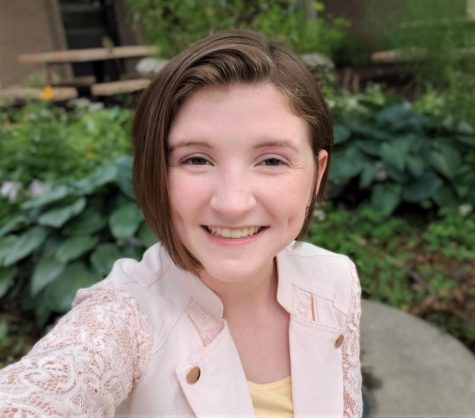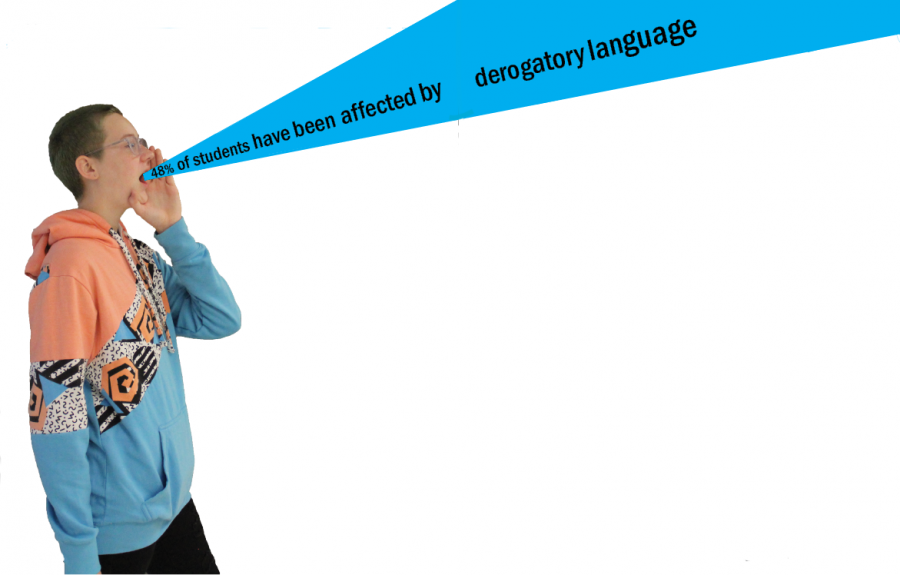“Take a joke”
Discriminatory language is no joking matter
Photo by Elinor Melvin
What is normal is not always right, but according to 63.9 percent of LZ students, slurs and offensive language is about as normal as it gets in the high school.
The issue
49.7 percent of students hear targeting language at least several times a week, and 71 percent of students report it most common between classes, according to a Bear Facts survey of 367 students. Kylie Blake, senior, has noticed as much in their three years at the high school.
“Kids swear, and it’s usually expected that they’re going to swear. It’s just a normalized thing and often not too big a deal. But then when you reach slurs, suddenly it’s a big issue,” Blake, who uses they/them pronouns, said. “I’ve [even] heard students just saying ‘that’s so gay’ as an insult, which isn’t a slur, but it’s offensive. It’s targeting a group of people.”
Gabrielle Shafer, senior, says she hears such targeting language multiple times a day, including racial slurs and especially LGBTQ slurs or using “gay” in a negative context. Shafer believes that with racism and homophobia already being issues in society, students “saying those words just sort of propagates these problems.”
“I was walking to gym once, and I heard a guy show his friend his gay impression, which was a Valley Girl voice,” Blake said. “He said ‘wow, this is so accurate I’m beginning to question my own sexuality,’ which I know was supposed to be regarded as a joke, but it was still an offensive stereotype and something that probably shouldn’t have been a joke.”
Blake said they first began to notice similar language students were using flippantly in the halls.
“My mind would catch on to those little keywords, and I’d start to overhear these things [that] would make me feel uncomfortable in the hallways around [these] people,” Blake said. “When I was walking behind that one guy using the voice, I didn’t feel like I was supposed to be in the same space as him. I suddenly felt very unwelcome.”
Normalization
Aside from the personal toll, Blake found another problem with not just the language itself, but the culture surrounding it. They found that when they heard slurs or insensitive jokes while with a friend, their friend might scoff, but dismiss it as immaturity, Blake said. This seemed to imply the language was not just present, it was normalized.
“I think that calling it immature is one of the things that makes it so normalized because you think it’s just teenagers being teenagers,” Blake said. “You have to have some degree of hate, some degree of lack of understanding, both of which I think are problems that need to be remedied.”
Offensive language’s normalization has gone as far as to alter Shafer’s perception of sexism both inside and outside of school.
“I’ve heard sexist things [in school], but that’s one of the things where I’m just kind of used to it because people say it a lot. Even media say those things, and I feel like, at this point, it’s just a joke to people. So it’s not like it’s offensive to me, but I noticed I’m used to it, which probably is not ideal, but I guess it’s better than having something be super offensive.”
Solutions
Since her freshman year, Shafer says she has heard less targeting language and credits some of that shift to media and social media that has corrected people. But she still finds issue with public perception of slurs and humor.
“People think they’re being alternative and edgy about saying these things,” Shafer said. “So I feel like by having a culture that thinks these things are bad, you also look at counter culture that [thinks] saying the bad things is cool. I think that’s why it still is a problem.”
Approaching the problem may be more difficult than it would seem, seeing as confrontation is not always the best option for students.
“I would really love to tell them that’s wrong and they shouldn’t be saying those things,” Blake said. “But I feel like to walk up and correct them, as much as I want to, and as much as I feel bad for not doing so, I feel like if I would be making myself a target in some way.”
Shafer feels similarly about hesitating to confront a peer about their language, explaining that she has her own “internal battle about what [to] do.” A better solution, according to Shafer, lies in changing the culture of the school to be so inclusive and welcoming that using such language is no longer considered cool at all. Though it may seem a difficult task, Shafer finds it more fitting for the school.
“Our school is really big about the whole ‘We are LZ’ and a community and stuff,” Shafer said. “But I feel like these words are separations in the community and show the divides within. So if we want to be a community, then we have to fix the divides and bridge those gaps.”

Elinor is finally a sophomore and on her second year as a writer, Business Manager, and LZ Life Editor for Bear Facts. She finds joy in being a small but...

